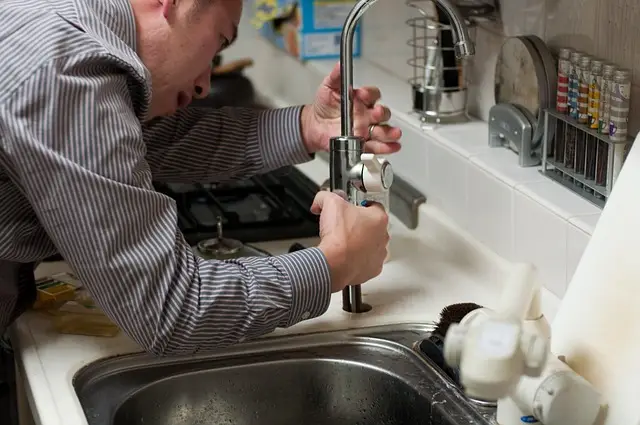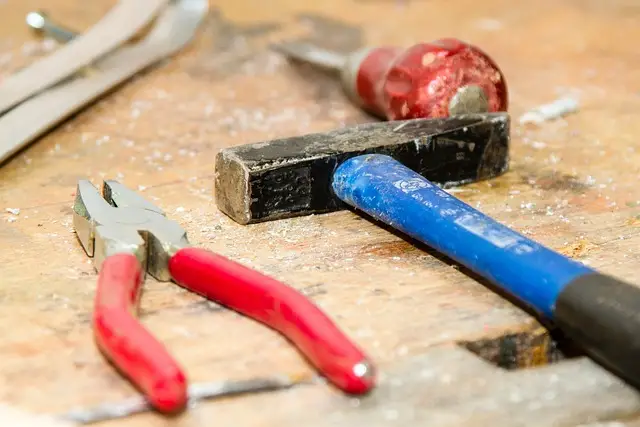Who is a handyman: A handyman is a versatile professional skilled in performing a wide range of repair and maintenance tasks. This can include fixing plumbing issues, conducting minor electrical repairs, doing carpentry work, and more.
They are often called upon to handle odd jobs, that are too small for licensed professionals but too complicated or time-consuming for homeowners to tackle themselves.
Importance of handyman skills: Handyman skills are vital because they enable individuals to maintain and repair their homes efficiently. Being able to handle minor repairs can save homeowners considerable time and money, and prevent small problems from turning into major issues.
Moreover, the demand for skilled handymen is high, making these skills valuable for employment and self-employment opportunities.
Essential Handyman Skills
Carpentry
Explanation of carpentry skills: Carpentry skills for a handyman can range from basic to advanced. Basic skills might include measuring, cutting, and fastening wooden and other materials, understanding blueprints or design sketches, repairing wooden structures, and more. Advanced skills may involve constructing and assembling wood furniture together, installing cabinetry, and working with specialized carpentry tools.
Importance in handyman tasks: Carpentry is at the heart of many handyman tasks. These can range from everyday fixes, such as repairing a broken step or a door, to more complex projects like installing a new set of cabinets or building a custom piece of furniture.
Carpentry skills are especially useful in tasks that involve wooden structures, which are common in many homes. In addition, many clients value handymen who can perform a wide variety of tasks, and having strong carpentry skills can significantly expand a handyman’s repertoire.
Therefore, carpentry skills not only increase the scope of jobs a handyman can take on, but also make them a more attractive choice for clients, potentially leading to more work and higher income.

Plumbing
Overview of basic plumbing skills for general handyman: Basic plumbing skills for a handyman might include understanding and diagnosing common plumbing issues, repairing and replacing various plumbing fixtures, such as faucets and showerheads, unclogging drains, and fixing minor leaks. Additionally, a handyman should be familiar with the basic components of a home’s plumbing system, such as pipes, valves, and water heaters.
Role of plumbing in handyman work:
Plumbing tasks are a common requirement in handyman work. Many homeowners need help with small plumbing issues that don’t require a full-fledged plumber, making it a routine part of a handyman’s job. By having basic plumbing skills, a handyman can provide a more comprehensive service offering and help clients with a broader range of home maintenance tasks.
Electrical Skills
Explanation of basic electrical skills: Basic electrical skills for a handyman include understanding how to safely turn off electricity, replacing light fixtures, switches and outlets, troubleshooting minor electrical issues, and basic wiring tasks. It also involves understanding electrical codes and safety procedures to avoid accidents.
Importance of electrical skills in handyman work: Electrical skills are important in handyman work because electrical issues are common in residential properties. Light fixtures might need to be replaced, outlets may stop working, or new appliances may need to be installed.
While more complex electrical work should be left to licensed electricians, a handyman with basic electrical skills can handle many minor electrical tasks, adding value to their services and making them more appealing to potential clients.

Painting
Fundamentals of painting skills: Handyman painting skills involve more than just applying paint to a surface. They include preparing surfaces for painting by cleaning, sanding, and priming; understanding different types of paint and their applications; using various painting tools such as brushes, rollers, and sprayers; and knowing how to create a neat, even finish. Safety measures, like proper ventilation, are also important.
The role of painting in a handyman service business at work: Painting is a common task in many handyman jobs. Homeowners may need a room repainted, a piece of furniture refinished, or an exterior surface touched up. Offering painting services can save money and therefore broaden a handyman service business’s service offering, making them a more comprehensive solution for home maintenance and repair needs.
Masonry
Basic masonry skills explained: Masonry skills for a handyman can include understanding how to work with materials such as brick, stone, and concrete; creating and applying mortar; shaping and laying bricks or stones; and repairing minor damage in masonry structures.
Importance of masonry in the handyman service list and services: While not every handyman job involves masonry, these skills can be very useful in a variety of contexts. For example, a handyman might be called upon to repair a stone walkway, patch a concrete wall, or build a small brick structure. Having masonry skills can therefore expand the range of professional services a handyman can offer and enable them to better meet the needs of their clients.
Tiling
Essential tiling skills: Tiling skills involve understanding how to prepare surfaces for tile installation and tiling, cut and lay tiles, apply grout, and seal and finish tiled surfaces. It also involves knowledge of different types of tile materials and their appropriate uses.
Importance of tiling in handyman tasks: Tiling is a common task in many home improvement and repair projects. Whether it’s repairing a tiled surface, replacing old tiles, or installing new ones in a kitchen or bathroom, handyman services often involve tiling work. By possessing tiling skills, a handyman can offer a more comprehensive range of services and address a wider variety of home maintenance and repair needs.

Advanced Handyman Skills
HVAC Maintenance
Importance and explanation of HVAC skills: HVAC (Heating, Ventilation, and Air Conditioning) skills involve the ability to maintain, diagnose, and fix common issues with heating and cooling systems. This can include cleaning and replacing filters, checking system performance, understanding basic wiring, and diagnosing common problems. These skills are essential as HVAC systems are common in homes and businesses, and proper maintenance can increase their lifespan and efficiency.
Appliance Repair
Explanation of appliance repair skills: Appliance repair skills can include the ability to troubleshoot and fix common problems with household appliances like refrigerators, ovens, washing machines, and dryers. This requires an understanding of how these appliances work, knowledge of electrical systems, and the ability to read and understand technical manuals and schematics.
Landscaping
Overview of basic landscaping skills: Basic landscaping skills for a handyman could include lawn care, tree and shrub trimming, planting and maintaining flower beds, installing and maintaining irrigation systems, and hardscape installation such as patios and walkways. Landscaping not only enhances the aesthetic appeal of a property but can also increase its value.
Remodeling
Fundamental remodeling skills required: Handyman skills in remodeling might include basic design and planning abilities, understanding building codes and regulations, demolition, carpentry, installing fixtures, painting, and finishing work. These skills are often required for home improvement projects and interior and exterior renovations, which can involve transforming a room or even an entire house.
Roof Repair
Explanation of roof repair skills: Roof repair skills involve understanding different types of roofing materials, diagnosing common roofing problems like leaks or shingle damage, and performing repairs. This might include replacing damaged shingles, repairing flashing, or sealing leaks. These skills are important as the roof is a crucial part of a home’s structure, protecting it from weather and other external factors.

Soft Skills for Handymen
Communication
Importance of communication in all the handyman services done: Effective communication is crucial in all the different handyman services done. It helps in understanding the client’s needs, setting expectations, explaining the process and time needed for repairs, and providing updates about the work progress. Moreover, good communication builds trust, fosters good relationships with clients, and can lead to more business through referrals and positive reviews.
Problem-solving
The role of problem-solving in handyman tasks: Problem-solving is integral to handyman tasks. Handymen often face a variety of challenges in their work, from unexpected repair complications to finding effective solutions for unique home maintenance needs. The ability to think critically, adapt, and find effective solutions is vital to completing tasks successfully and satisfying clients.
Time Management
Importance of time management for handymen: Effective time management is essential for handymen. They often have to juggle multiple projects or tasks, ensure that jobs are completed within the agreed timeframe, and allocate time for unexpected issues or emergencies. Good time management can increase efficiency, improve customer satisfaction, and ultimately lead to more even business operations.
Customer Service
Importance of customer service in top handyman services’ business: Providing excellent customer service is vital in the whole professional handyman services’ business. This involves not only completing tasks to a high standard but also being polite, respectful, punctual, and responsive to customer needs and concerns. Great customer service can help to build a good reputation, encourage repeat business, and generate positive word-of-mouth referrals.

How to Develop and Improve Handyman Skills
Education and Training Opportunities: Many community colleges and vocational schools offer classes in handyman skills. These handyman professionals can range from basics like carpentry, plumbing, and electrical work, to more advanced skills such as HVAC maintenance and appliance repair. Additionally, online tutorials and DIY books can be a great resource.
Handyman Certification Programs: Several organizations offer specialized professional handyman certification programs. These programs provide formal training and can enhance credibility in the field. Moreover, being certified can open doors to more job opportunities and potential clients.
Practice and Hands-on Experience: As with any skill, practice is crucial. Hands-on experience, whether through your own home improvement projects or through on-the-job experience, is the best way to improve handyman skills.
Continuous Learning and Staying Updated: The field of home improvement is ever-evolving, with new tools, techniques, and safety measures regularly being introduced. Continuous learning and staying updated on these changes are vital for any handyman wanting to stay ahead.
Conclusion
Recap of Handyman Skills Importance: Handyman skills, ranging from carpentry and plumbing to problem-solving and customer service, are vital for maintaining and improving homes. They not only enable homeowners to fix minor issues but also provide numerous employment opportunities.
Encouragement for Continuous Skill Development: It’s important for handymen to continuously develop and enhance their skills. This can be achieved through education, training, practice, and staying updated on the latest developments in the field.
Call to Action
Encourage readers to share the article: If you found this article helpful, please feel free to share it with others who might benefit from it.
Invite comments and personal experiences: We’d love to hear about your experiences and any additional handyman skills you believe are important. Please leave your thoughts in the comments section below.
Keywords to be included for SEO optimization:
Throughout this article, we have aimed to cover a comprehensive list of handyman skills, focusing on areas such as carpentry, plumbing, electrical work, interior painting,, masonry, tiling, HVAC maintenance, appliance repair, landscaping, remodeling, and roof repair. We’ve also emphasized the importance of soft skills like communication, problem-solving, time management, and customer service.
Additionally, we discussed opportunities for education and training for handymen, handyman certification, handyman service jobs, handyman business software and the value of continuous learning for professionals in this field.
List of Handyman services
Here is handyman services list that can include the aforementioned keywords:
Drywall Repair Jobs
Fixing holes, cracks, and other damage in drywall surfaces; replacing doors repairing water-damaged drywall; patching and painting over drywall repairs.
Fixture Replacement Jobs
Replacing outdated or damaged light fixtures, faucets, showerheads, and door handles; installing new fixtures as part of a home remodeling project.
Furniture Assembly
Assembling flat-pack furniture; building custom furniture pieces; make furniture covers; fixing broken furniture parts, window covering services.
Gutter Cleaning
Removing leaves, twigs, and other debris from gutters; inspecting and repairing gutter damage; installing gutter guards to prevent future clogs.
Minor Electrical Services
Replacing light switches and outlets; installing ceiling fans and light fixtures; troubleshooting and fixing minor electrical issues.
Pressure Washing Services
Pressure washing driveways, walkways, and patios to remove dirt, mold, and mildew; cleaning home exteriors and fences with a pressure washer.
Interior Storage Solutions
Designing and installing shelving and storage solutions in closets, garages, and other spaces; assembling and using seasonal furniture; installing pre-fabricated storage units; customizing storage spaces to meet specific needs.
These jobs can range from quick fixes to more in-depth projects, and they all involve using a variety of handyman skills to improve the function and appearance of a home.
Explore 50+ handyman business ideas which can be profitable